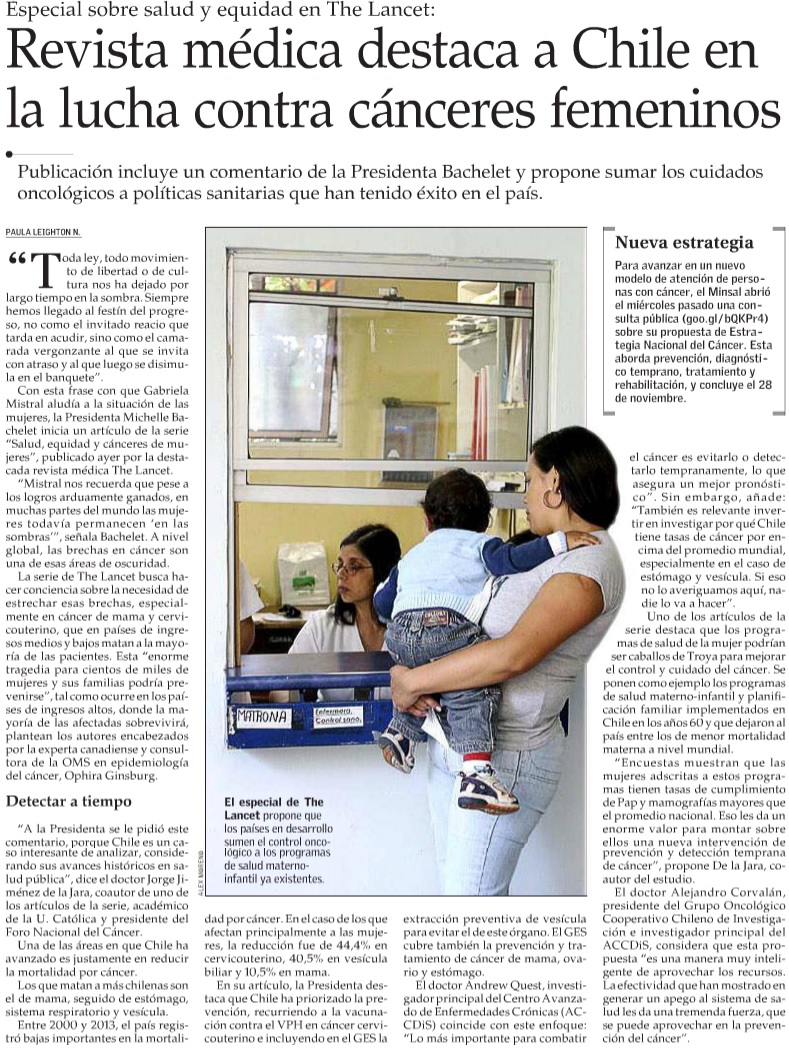Magazine medical highlights to Chile in the fight against cancer female

Publication includes a comment from President Bachelet and proposes join cancer care health policies that have been successful in the country.
With this phrase with that Gabriela Mistral alluded to the situation of the women, President Michelle Bachelet begins a series article “Bless you, equity and cancers of women”, posted yesterday by the leading medical journal The Lancet.
“Mistral we remember that despite the achievements hard earned, in many parts of the world women still remain ‘ in the Shadows '”, said Bachelet. At the global level, the gaps in cancer are an of those areas of darkness.
The Lancet series seeks to raise awareness of the necessity of strengthening those gaps, especially in breast and cervical cancer, that in countries of income means and low kill to the majority of the patients. This “huge tragedy for hundreds of thousands of women and their families could prevent it”, as happens in those countries of income high, where the majority of those affected will survive, raise the authors led by Canadian expert and a consultant for the WHO in cancer epidemiology, Ophira Ginsburg.
Detect in time
“To the President are you asked this comment, because Chile is an interesting case of analyzing, whereas their advances historical in health public”, says Dr. Jorge Jiménez de la Jara, co-author of one of the articles of the series, academic of the U. Catholic and President of the National Cancer Forum.
One of the areas in which Chile has advanced is in reducing mortality from cancer.
Those who kill more Chilean are breast, often of stomach, System respiratory and gallbladder.
Between 2000 and 2013, the country recorded important low in cancer mortality. In the case of those who affect mainly to the women, the reduction was 44,4% in cervicouterino, 40,5% gallbladder and 10,5% in breast.
In his article, the President points out that Chile has prioritized prevention, resorting to vaccination against HPV in cervical cancer and GES including preventive removal of gall bladder to avoid of this body. The GES covers also the prevention and treatment of cancer of breast, ovary and stomach.
Dr. Andrew Quest, Senior researcher at the Center for advanced chronic diseases (ACCDiS ) coincides with this approach: “The most important thing to fight cancer is to prevent it or detect it early, which ensures a better prognosis”. However, Adds: “It is also important to invest in investigating why Chile has cancer rates above the global average, especially in the case of stomach and gallbladder. If that do not know here, No one it is going to make”.
One of the articles in the series highlights women's health programs could be Trojan horses to improve control and cancer care. Examples include maternal and child health and family planning programmes implemented in Chile in the 1960s that left the country among the lowest maternal mortality in the world.
“Surveys show that women assigned to these programmes have Pap compliance rates and higher than the national average mammograms. That gives them a huge value to set upon them a new intervention for the prevention and early detection of cancer”, aims of the Jara, study co-author.
The doctor Alejandro Corvalan, President of the Group Oncology cooperative Chilean of research and researcher main of the ACCDiS, considers that this proposal “It is a very smart way to leverage resources. The effectiveness that have shown in generate an attachment to the system of health them gives a tremendous strength, that it can take advantage of in the prevention of the cancer”.
Paula Leighton N.
Life science technology
El Mercurio

